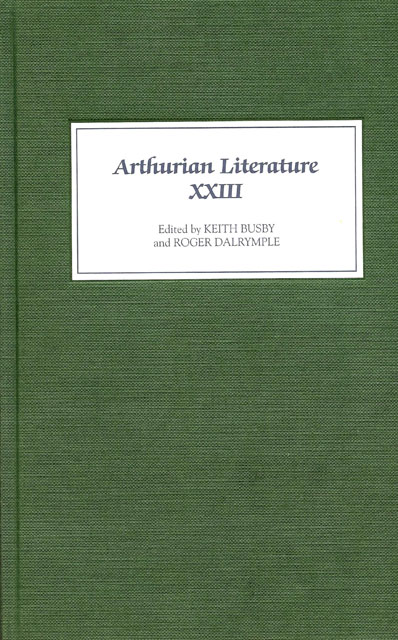Book contents
- Frontmatter
- Contents
- General Editor’s Foreword
- I Beyond Shame: Chivalric Cowardice and Arthurian Narrative
- II Malory’s Forty Knights
- III Fooling with Language: Sir Dinadan in Malory’s Morte Darthur
- IV William Caxton, Wynkyn de Worde and the Editing of Malory’s Morte Darthur
- V Ballad and Popular Romance in the Percy Folio
- VI Local Hero: Gawain and the Politics of Arthurianism
- VII Promise-postponement Device in The Awntyrs Off Arthure: a Possible Narrative Model
- VIII L’Atre perilleux and the Erasure of Identity
- IX The Theme of the Handsome Coward in the Post-Vulgate Queste del Saint Graal
- X A Time of Gifts? Jean de Nesle, William A. Nitze and The Perlesvaus
- XI Thomas Love Peacock’s The Misfortunes of Elphin and the Romantic Arthur
- Contents of Previous Volumes
II - Malory’s Forty Knights
Published online by Cambridge University Press: 23 March 2023
- Frontmatter
- Contents
- General Editor’s Foreword
- I Beyond Shame: Chivalric Cowardice and Arthurian Narrative
- II Malory’s Forty Knights
- III Fooling with Language: Sir Dinadan in Malory’s Morte Darthur
- IV William Caxton, Wynkyn de Worde and the Editing of Malory’s Morte Darthur
- V Ballad and Popular Romance in the Percy Folio
- VI Local Hero: Gawain and the Politics of Arthurianism
- VII Promise-postponement Device in The Awntyrs Off Arthure: a Possible Narrative Model
- VIII L’Atre perilleux and the Erasure of Identity
- IX The Theme of the Handsome Coward in the Post-Vulgate Queste del Saint Graal
- X A Time of Gifts? Jean de Nesle, William A. Nitze and The Perlesvaus
- XI Thomas Love Peacock’s The Misfortunes of Elphin and the Romantic Arthur
- Contents of Previous Volumes
Summary
The Rebellion of the Kings episode in the first tale of Malory's Morte Darthur contains a contradiction. King Arthur and his allies King Ban and King Bors are fighting a battle in which their enemies retreat across a river and prepare to make a stand. The Winchester manuscript then says:
So furthwith there dressed a fourty knyghtes, and seyde unto the thre kynges they wolde breke theire [i.e., Arthur's enemies’] batayle, and thes were theire namys: Lyonses, Phariaunce, Ulphuns, Brascias, Ector, Kayus, Lucas de Butler, Gryfflet la Fyse de Deu, Marrys de la Roche, Gwynas de Bloy, Bryaunte de la Foreyste Saveage, Bellaus, Morians of the Castel Maydyns, Flaundreus of the Castel of Ladyes, Annecians that was Kynge Bors godson, a noble knyght, and Ladinas de la Rouse, Emerause, Caulas, Graciens le Castilion, Bloyse de la Case and Sir Colgrevaunce de Goore.
The Caxton text is essentially identical.2 The problem with this passage is that ‘thes were theire namys’ implies that all the forty knights are going to be named, but we are only given 21 names.
Nearly all editors of Malory simply reproduce their base text, Winchester or Caxton as the case may be. Eugène Vinaver was the first editor to comment, and the only one to emend. He thought that a scribe must have misread the roman numeral xxi as xl, and emended W's fourty to twenty-one, a reading that I varied to one-and-twenty when I revised his great edition. Unfortunately, although scribes can do all sorts of surprising things, no common scribal error or combination of common scribal errors would make a scribe substitute forty for twenty-one in any permutation of words and numerals, roman or arabic. The only other editor to comment was James Spisak, who, after comprehensively misunderstanding Vinaver's argument, suggested that Malory might have taken the number and the names from different places and overlooked the inconsistency. Spisak's editorial work has not been well received, but I shall argue that he was right and Vinaver was wrong.
Many textual cruces in Malory's work can be resolved by close comparison between the surviving texts and his major sources, so the natural place to start looking for a solution is in the major source for the Rebellion of the Kings episode, a thirteenth-century French version of the rebellion story whose status has been the subject of a good deal of scholarly dispute.
- Type
- Chapter
- Information
- Arthurian Literature XXIII , pp. 18 - 29Publisher: Boydell & BrewerPrint publication year: 2006



